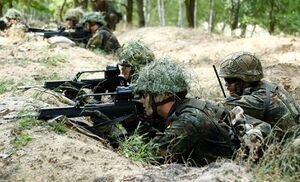Bakyern: Difference between revisions
No edit summary |
|||
| Line 157: | Line 157: | ||
===Economy=== | ===Economy=== | ||
The economy of Bakyern is large, with the national GDP being at 5 trillion Bak Notes. The economy of Bakyern relies on its expansive industrialization and the money that many technological companies make. Agriculture is a big part of the Bak economy as well, as many exports include wheat and agricultural goods. Bakyern's economic rival is [[Gabrielland]]. | The economy of Bakyern is large, with the national GDP being at 5 trillion Bak Notes. The economy of Bakyern relies on its expansive industrialization and the money that many technological companies make. Agriculture is a big part of the Bak economy as well, as many exports include wheat and agricultural goods. Bakyern's economic rival is [[Gabrielland]]. Bakyern's GDP is over $5 Trillion. | ||
===Government=== | ===Government=== | ||
Revision as of 13:44, 27 July 2020
Federal Republic of Bakyern Bundesrepublik Bakyern | |
|---|---|
| Motto: "Arbeit, Kraft, Intelligenz." "Work, strength, and intelligence" | |
| Anthem: Die Stimme des Bak-Volkes | |
 Map of the Administrative Regions of Bakyern | |
| Capital | Federal District of Wicht |
| Largest Federal District | Beselsingen |
| Official languages | German |
| Recognised national languages | German, English |
| Ethnic groups | Bakyernians Nelbergians |
| Religion | Roman Catholicism, Samiism |
| Demonym(s) | Bak |
| Government | Federal Wenelistic Presidential Republic |
• Federal President | Bernhard Strassmann |
• Vice President | Ernsta Bauer |
• Chancellor | Adalmar Haas |
| Legislature | Bundeskongress |
| Bundessenat | |
| Bundesrat | |
| Establishment | |
• Arrival of Nomads | 87 A.D. |
• Beginning of Bak Civilizations | 1014 A.D. |
• Formation of City-States | 1437 A.D. |
• Samiist Pilgrimage | 1642 A.D. |
• Confederation of Bakyern | 1762 A.D. |
• Kingdom of Bakyern | 1834 A.D. |
• Federal Republic of Bakyern | December 24th, 2019 |
| Population | |
• 2020 estimate | 94,000,000 |
• 2010 census | 87,013,512 |
| GDP (PPP) | estimate |
• Total | $5.28 Trillion |
• Per capita | $56,191 |
| Currency | Bak Note (BN$) |
| Time zone | UTC-4 |
| Driving side | right |
| Calling code | +4 |
| Internet TLD | .bk |
The Federal Republic of Bakyern (Bakyern: Back-yern) is a country laying on the coast of the Clabury Lake and bordering Grafenland and Junterland. It has around 25 federal states and two federal districts. At 2,058,726 kilometers of territory, it is a country of particularly large size. It has a relatively large population of 87 million people. The capital is the Federal District of Wicht and largest city is Beselsingen.
Bakyern was founded in 1834 as the First Kingdom of Bakyern following the Landbergen Accords were signed which united the Confederation of Bakyern into a single nation. The Kingdom evolved into the Second Kingdom of Bakyern and eventually modern day Bakyern. The first nomads have been studied to have arrived in 87 A.D. and the first civilizations in 1014 A.D.
Bakyern is a Federal Republic, and practices state Wenelism as its state ideology.
History
Arrival of Nomads
According to archaeological findings, the first people settled in Bakyern in 87 AD as nomads. The first settlements have been seen to have appeared around the coast and western Bakyern, with huts and villages still remaining to this day. The nomads engaged in an agricultural lifestyle, creating and farming mass lands of wheat and agricultural goods.
Beginning of Bak Civilization
As the nomads began to evolve, the first civilizations began to pop out in Bakyern. The largest being the Wichten Civilization which lasted for several decades. The Bak Civilizations began to expand into the borders of modern-day Bakyern and soon into Qazhshava, warring the local Qash tribes and civilizations until they abandoned Qazhshava and returned to Bakyern.
Antiquity
In the antiquity period, the civilizations began to form into Kingdoms and Duchies which occasionally warred with each other and traded. This period didn't last for long, within several decades, through warring, the kingdoms and duchies collapsed into city-states excluding the Duchy of Wichten and the Kingdom of Bauyern.
City-States Period
During the city-states period, the city-states continued warring against each other. As they continued annexing each other, the Duchy of Wichten and Kingdom of Bauyern continued their expansion based on the Leifeheden Doctrine created by Kaiser Leifeheden of Bauyern. Through diplomacy and wars, the city-states continued to strike deals such as the Treaty of Landenberg which began the Confederation of Bakyern.
Confederation of Bakyern
The Confederation of Bakyern was a political hemisphere formed after the Treaty of Landenberg with the intention of unifying and creating a single Bak nation. The Confederation dissolved in 1831 after the formation of the First Kingdom of Bakyern.
Government
Economy
The economy of Bakyern is large, with the national GDP being at 5 trillion Bak Notes. The economy of Bakyern relies on its expansive industrialization and the money that many technological companies make. Agriculture is a big part of the Bak economy as well, as many exports include wheat and agricultural goods. Bakyern's economic rival is Gabrielland. Bakyern's GDP is over $5 Trillion.
Government
The government of Bakyern is a Federal Wenelistic-Conservative government. Corporations frequently meddle in state affairs, participating in the Federal Congress. Corporations such as Ares Corporate and other big name corporations participate and own parts of government agencies. The legislation of the nation is done by the Federal Congress, or Bundeskongress.
Foreign Relations
Foreign Relations with other countries is mainly neutral, with barely any allies. Bakyern maintains excellent relations with Shedehnoah and Polder Eiland. The Federal Ministry of Foreign Affairs is entirely responsible, with no corporations for once being allowed to meddle with foreign affairs.
Military
The Bak Bundesheer is the strongest army in the region alongside Gabrielland. The Bak Bundesheer has modern equipment and has access to a wide nuclear stockpile of approx. 100 nuclear warheads. There are over 970,000 personnel in the Armed Forces. Mandatory Military Service isn't in service, with drafts only being done in times of crisis during conflict. The Federal Ministry of Defense is responsible for the military and matters of national defense.
Law & Crime
The crime in Bakyern is relatively low, but the law enforcement agencies such as the Federal Police Service have been seen as too militarized, with them owning military grade APCs and firearms. The majority of crimes in Bakyern consist of corporate fraud, drug usage, and vandalism. The state protects freedom of speech, but demonstrating against the wishes of the government isn't considered as freedom of speech and will lead to arrest.
Infrastructure
Energy
The national energy grid relies on nuclear energy, wind power, coal energy, and solar energy. With nuclear energy being widely used, the Federal Ministry of Energy has stated that over 45% of Bakyern's energy is produced by nuclear power plants in Bakyern. A large number compared to its neighbors. Due to regulations created by corporations, emission standards aren't in place, with coal plants being extremely polluting to the environment.
Transportation
The Transit Commission collaborates with the Federal Ministry of Transportation to create a wide system of bus transportation, train transportation, and trams. Although the majority of Bak adults own a vehicle, many people under the age of 18 rely on public transportation to get around. Although school buses are a rare sight, the Transit Commission offers free tickets to students.
Demographics
Ethnic Groups
The largest ethnic group in Bakyern are the Bakyernians. They inhabit over 89% of territory inside of Bakyern. The Nelbergians are the second largest ethnic group in Bakyern, mostly inhabiting the south and west of Bakyern.
Education
The majority of Baks have a college degree or a high school diploma. The majority of students go to Public School while a particularly large percent of students go to private schools in Bakyern. The Federal Ministry of Education regulates education, with passing the 9th Grade being mandatory for everyone in Bakyern 94% of Baks over the age of 29 have attended college and passed thanks to Bakyern's affordable education plans.
Religion
The largest religion in Bakyern is Samiism, while the second is Weudelism. While Weudelism is native to Bakyern, it has seen a decline as Samiism continues to grow in members and size. Bakyern has no state religion and refrains from having one as corporatism continues to impact the nation's religions. Weudelism is the oldest religion in Bakyern and is the only native one.
Culture
Food
The Bak cultural cuisine mainly consists of meat and bread, with over 290 types of bread in Bakyern alone. The majority of Bak cultural cuisine evolved from the cuisine in eastern Bakyern by Nelbergians and Bakyernians. Sausages have become a staple food of Bakyern's meat industry, while cattle are in high demand, sausages are preferred.
Art
Bak art dates back as 1653, with infamous artists such as Georg Wolff creating massive canvases and pieces of art considered one of the best in modern day Anteria. Bak Art has revolutionized modern art.
Mass Media
Bakyern's largest broadcasting companies are the Bak Broadcasting Company, National Agency for Broadcasting, and the Federal Broadcasting Agency. Cable Television dominates 64% of Bak TV users, with the other percent being satellite television. There are reportedly over 2,000 AM stations and over 3,000 FM stations broadcasting 24/7.




